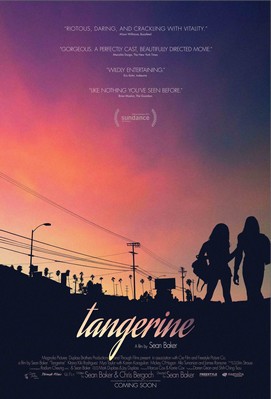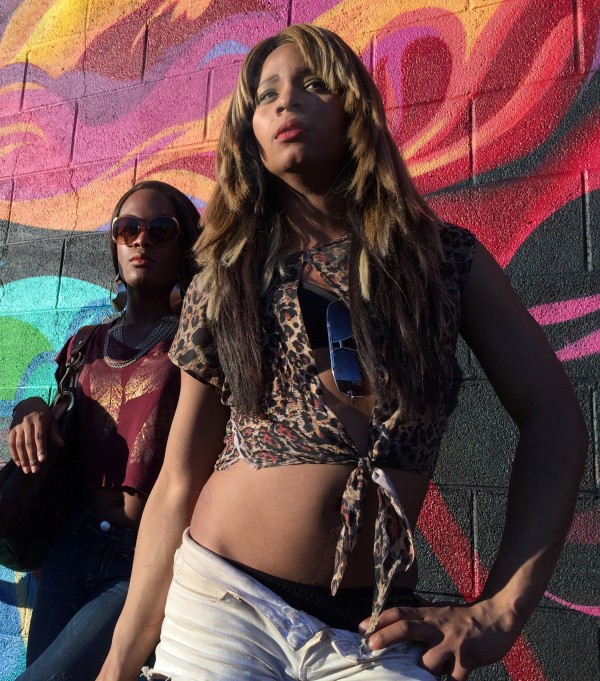
Whenever I see a movie about the lives of sex workers, I find myself automatically assessing whether or not the story represents us authentically—or, more accurately, picking apart the ways that it inevitably doesn’t. Tangerine was really the first time I’d seen a movie about us where I didn’t leave the theater with a mental catalog of all the ways they had screwed up. Still, I felt a little ill-qualified to write a review, seeing that it centers around the lives of two black, transgender sex workers on the harsh streets of L.A., and I’m a white, cisgender chick who did pretty much all her hustling online. On one hand, it felt like someone had finally gotten it right, and on the other, I felt like a total faker for feeling that way about the experience of women whose lives are so different from mine in so many ways.
Though I didn’t know it going in (perhaps for the better?) Tangerine was directed by Sean S. Baker, a straight, white, cisgender guy with a film degree from N.Y.U. Collaborating with Mya Taylor, a black trans woman he met in L.A., Baker created a film about the sex workers he saw working in Hollywood. The idea to make a comedy rather than a tragedy was Taylor’s, which puts so much of the film in perspective for me: I know sex workers (and likely trans women, too) have seen ample tragic portrayals of their lives crafted by men outside the business.
It’s Christmas Eve in Hollywood, and Sin Dee Rella (Kitana Kiki Rodriguez) has just been released from a 28-day jail sentence, which we find out later was her punishment for holding her beloved pimp/boyfriend Chester’s (James Ransone) stash. While celebrating her newfound freedom over a donut with her BFF, fellow transgender sex worker Alexandra (Mya Taylor), she learns that while she was doing time, her pimp/boyfriend Chester had been cheating with a “fish” (which I learned means a cisgender woman). And thus begins a rampage through the L.A. underground to find the offending fish and confront Chester.

The first thing I noticed was how accurately Baker and Taylor portray relationships between workers and clients. At best, Sin Dee and Alexandra have amicable, slightly maternal feelings toward them (rather than the romantic fantasies of Pretty Woman), and at worst, they find the guys entitled and annoying, but nothing they can’t really handle. There’s a tendency among civilians (and customers with white knight fantasies) to imagine our typical “bad” clients as dangerous, sociopathic rapists, rather than the more mundane reality (delusional narcissists). People widely hold this stereotype about even “high-end” clientele, and much, much more so about guys of Tangerine’s socioeconomic milieu. So I was particularly delighted by a scene of Alexandra’s car date with the archetypical difficult client, someone I’m pretty sure every last one of us has met, regardless of the exact services we offer or how much we charge for them. First he tries to haggle (because “it’s Christmas!”), then he demands a BBBJ—and my heart skipped a beat as Alexandra, bored and unimpressed, holds her ground. It would have been way too easy for this moment to devolve into an anti-sex work pity charade. Instead, the pathetic client humiliates himself further by insisting to Alexandra, “You know you want it,” to which she responds in perfect deadpan, “You see right through me.” Just another day at the office.
There is a substantial subplot about a regular customer, Razmik (Karren Karagulian), an Armenian cab driver with a wife and young daughter whom he’s supporting. We see short vignettes of his life throughout the day, as he deals with his own difficult and eccentric customers: obnoxious, drunk 20-somethings; a woman who calls a cab home from the vet after euthanizing her dog; and an older Cherokee guy who wants to give the cabdriver his biography during the short ride. These scenes, interspersed with the story of Sin Dee, display how much all customer service jobs have in common—we all become interchangeable faces witnessing our clients’ intimate moments. There’s no doubt that the sex work in this film is presented as work, just one of many ways to make ends meet, rather than the ultimate affront to dignity and self-respect that other films like to portray it as.

That said, Baker doesn’t ignore the reality of dangerous working conditions, particularly for lower income trans women. The movie opens with Sin Dee leaving jail, and Alexandra has a brush with cops halfway through. The encounter ends peacefully, but it also indicates that they’re a regular presence and a persistent threat in her life. We also see a decent amount of transphobia, with Sin Dee and Alexandra occasionally misgendered by other characters, and Sin Dee the victim of an assault in the final scene. The police presence, the transphobia, and the moments of imminent or actual violence are all presented as a backdrop to the main plot of the movie, though. It’s a film that is ultimately about the daily lives of a few vivid, endearing characters, rather than a movie about trans issues or a dramatization of hooker life.
Reflecting on it later, I was reminded of one of my all-time favorite movies: 1999’s Trick, a cute, cheesy rom-com about gay guys who meet in a nightclub. The guys have their own respective mostly gay communities, and the gay “issues” of the time never surface. Not once does someone mention AIDS, coming out, or someone’s abusive family who doesn’t accept them. I read later that it was the one of the first movies of its kind for the gay community, where “oh my God, they’re gay” wasn’t the primary storyline all on its own. It’s a story first and foremost about characters, and their backgrounds, identities, and problems are secondary to the story being told. I’d like to think that Tangerine could be this for sex workers.

Trans sex workers’ rights activist Morgan M. Page points out that it’s also one of very few films that portrays trans women in relationships with other trans people. “Most films produced by and for cis people presume that trans people are islands, unattached to communities of other trans people, drowning in a sea of cis people,” she explains. “In this way, Tangerine succeeds where nearly every film and book featuring trans characters written by cis people has failed for the past one hundred years in Anglophone culture.”
So rather than portraying isolated transgender stock characters, whose stories only matter in how they relate to the wider cisgender world, Tangerine shows its trans women interacting in their own community. I would say Page’s observation also holds true for sex workers, as I have a hard time remembering many films that show any sex workers, trans or cis, hanging out in our own established social groups, with no dramatic moments hinging on whether or not someone would quit the business.
Page also adds that while watching the film in a an audience of mostly white cisgender people, she “couldn’t help but wonder if the joke was actually supposed to be these women’s lives.” Though I felt a strong sense of identification with the characters, I know watching it as a sex worker give me a bias for sympathizing with them across race, class and gender lines that non-workers wouldn’t understand. And I couldn’t help considering the fact that the transgender characters, and only the transgender characters, were first-time actresses without impressive IMDB pages. In that sense, I wondered if I was unwittingly watching it from an anthropological perspective, like “let’s hire some Hollywood pros to go in and interact with these low-income trans prostitutes in their native environment.” On the other hand, this could also just speak to the lack of opportunities for trans women in mainstream Hollywood—if there are no good parts available, there won’t be a huge roster of talent to choose from.
Mey, a trans woman who writes for Autostraddle, seemed to share my sentiments for what the film could mean in the trans community, as she wrote in her review that this was the first film she saw that didn’t make her feel like the trans characters were othered. She writes, “I finally felt like I was a part of the intended audience.” I would say the same thing about how it portrays sex workers: I didn’t feel like I was watching my own life through a tourist perspective, but instead like one of my friends made a movie about our own crazy lives. Race, class and gender differences aside, this felt like the Sex in the City (or whatever other girl bonding movie) for my own people.

“Fish” is a misogynist term used to describe women within the Black gay male ball scene/culture. It’s offensive and hateful
I’m not sold on the idea that the most persecuted people on the planet have the power–in terms of relative structural privilege and social capital–to be misogynistic.
But how can you ignore the misogyny ? Woman = “fish”, trans women stalking the “fish” to confront/punish her v.s. the cheating boyfriend ? WTF ?
In one low income black neighborhood I lived in, the women referred to the female crotch as a “fish”. I just assumed that using the word in the film to refer to ciswomen was analogous to calling a woman a cunt, and just as insulting. But when I think about it, I need to know more about speaker, audience, and general usage before coming to a conclusion. A movie is too superficial to allow a definitive conclusion about word usage in a neighborhood on the other side of the continent from me.
If your partner is cheating, but feels committed to your relationship, you can tell them that the third party has to go, and leave it to them to take care of it. In the case of Sin Dee Rella, I think there was more commitment on her side than on Chester’s. So she had the choice between giving up the relationship and driving off the competition. I’ve seen similar things happen when cis people of both genders had cheating partners. It has less to do with misogyny than with the choices forced on you by asymmetrical commitment.